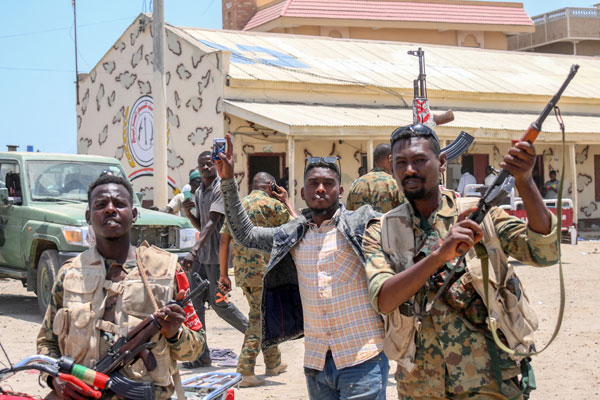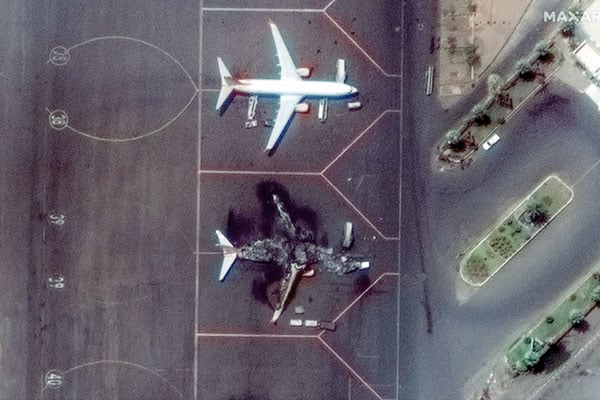Heavy fighting in Khartoum blocks Uganda ‘rescue’ plans

A column of smoke rises behind buildings near the airport area in Khartoum on April 19, 2023, amid fighting between the army and paramilitaries following the collapse of a 24-hour truce. PHOTO/ AFP
What you need to know:
- At least 300 Ugandans are stuck in Khartoum City and its surrounding areas.
Uganda’s ambassador in Khartoum yesterday said heavy fighting between rival government military forces continues to make it very difficult to safely evacuate Ugandans trapped inside Sudan.
Dr Rashid Yahya Ssemuddu and his embassy team have issued a special notice advising Ugandan nationals to continue sheltering in place. The notice urges people to lie low as the embassy closely monitors the current conflict in Sudan, and the war between Sudan Armed Forces (SAF) and Rapid Support Forces (RSF), which broke out on Saturday, April 15.
The envoy said although the Uganda government, working through the embassy is trying to evacuate Ugandans, the situation remains fluid and difficult after the conflicting forces failed to honour a temporary ceasefire agreement.
“We are working on the evacuation plans. We already contacted the relevant authorities and we are waiting for their approval but it’s still tricky,” he said yesterday.
At least 300 Ugandans are stuck in Khartoum City and surrounding areas. Fighting is raging between the rival military and paramilitary forces who assumed power following the bloody October 25, 2021 coup, which saw the military wrest power from a transitional civil-military coalition.
The coalition had been in charge since August 2019. It was established as an interim partnership between the army and leaders of a civilian uprising that had precipitated the military overthrow of former longtime strongman, Omar-al-Bashir in April 2019.
The country has remained restive since then.
Sudan Army chief Abdel Fattah al-Burhan and his former deputy, Mohamed Hamdan Daglo, who commands the paramilitary Rapid Support Forces are locked in an all-out war, which has claimed hundreds of lives.
By press time last evening, sources said fighting was reported to be particularly intense in the northern parts of Khartoum.
Among the trapped Ugandans are 120 workers employed in both the formal and informal sectors; 116 students; 14 in hospitals; 19 in transit, and six who were on short visits to Khartoum.
Dr Ssemuddu revealed that a plan by the German government to evacuate 150 of its nationals had failed.
“They failed after completing all the necessary arrangements,’’ he said.
The latest communication from the government of Sudan through its Foreign Affairs ministry continues to cast doubt on the possibility of early evacuation of foreigners. In a Tuesday press statement, the ministry asked all Sudanese nationals and foreigners to remain indoors.
On Monday, Dr Ssemuddu issued a special notice, guiding Ugandans to continue staying in their homes, schools, hotels, and wherever the war found them. The notice included a list of seven contact persons who can be reached in case of emergency through telephone numbers which were also provided.
“We are coordinating with authorities back home and key agencies to facilitate evacuation plans,” he said.
Commenting about the 19 Ugandan Muslim pilgrims who were in transit to Mecca, Saudi Arabia, Dr Ssemuddu said that on Tuesday they were able to relocate them from the bombed-out airport hotel, Al Kabri Alasham.
The pilgrims are now sheltered in the relatively safer Al- Ebdaa Hotel Apartments in Omdurman on Al-Fatihab Street, South Siraj Station, Khatourm.
Mr Muhamad Shaawal, the director of Al-shwaal Hajj and Umrah Ltd, which arranged the pilgrims’ travel, confirmed Dr Semuddu’s statement.
“We thank the government, our embassy in Sudan, the Sudanese government which provided security for our brothers and sisters,” he said.
Hope runs low
Some of the trapped Ugandans who spoke to this publication are fearing for their lives.
Mr Ratib Bayiga, the chairperson of a loose association bringing together Ugandan Workers in Sudan, said he mobilised colleagues to be ready to move at a moment’s notice.
“The embassy told us to be ready. As I speak, I have compiled a list of 100 of our members who have submitted their passport details to me and we are just waiting if the situation calms then we return home,” he said, explaining that communication is mainly possible through intermittent internet connections.
Mr Yusufu Mukholi, who is providing leadership to the 120 students trapped at the Mandan Street-based International University of Africa, also said that Uganda embassy officials recorded their particulars with hopes of evacuating them.
“We are currently indoors at the International University of East Africa,” he said.
Mr John Mulimba, Uganda’s minister of State for Foreign Affairs (Regional Affairs), on Tuesday informed Parliament that the government has approached the International Organisation for Migration and the UN, and requested assistance in bringing back Ugandans.
Emergency contacts from Uganda embassy
1. Dr. Rashid Yahya Ssemuddu, Head of Mission/ Ambassador -+256703888879/+9745078808
2. Dickson Ogwang, Head of Chancery/ PRO +249992650468/+256772627436
3. Brig. Gen. Freddie Karara, Defence Attaché/ Security Advisor-+24999151014/+256772426977
4. David Wamono, Second Secretary +249961488564/+256782579346
5. Ms Hajer A. Elkateem Ashgar, Political/ Com. Affairs Officer +24991252439
6. Abraham Obuatu, Embassy Liaison Officer +249902660001
7. Uganda Diaspora Representative Chairperson, Uganda Community +249995145631
8. Uganda Student Representative Chairman, Student Community +249902660001




